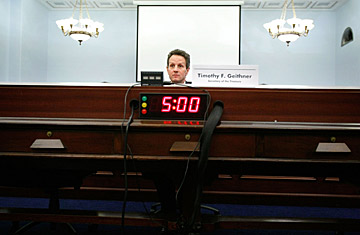
U.S. Secretary of the Treasury Timothy Geithner testifies during a hearing before the House Budget Committee on Capitol Hill.
It is one thing when someone can't make a mortgage payment or a company cannot cover the interest on capital it borrowed to build a new factory. In a recession, those kinds of events are commonplace. It probably never crosses the mind of the average citizen that the ability of the U.S. government to borrow money for deficits, bailouts, mortgage-assistance programs, and refurbishing the monuments in Washington is not limitless. The term infinite may apply to the cosmos but it does not apply to the debt carried by the U.S. Treasury.
MarketWatch pointed out that the spreads on credit-default swaps for U.S. government debt jumped to 97 basis points Tuesday, nearly seven times higher than a year ago and 60% higher than at the end of last year, to a level roughly in line with those of France, according to data supplied by Markit. Those swaps are gambles that America will renege on its financial obligations. Being on par with France is even more humiliating than if we were compared to Cameroon which had a GDP of only $44 billion last year, less than Bernie Madoff took from his clients. (See pictures of the Demise of Bernard Madoff.)
While it may be hard to imagine, what the market's response means is that the economic crisis is so serious now that it is believed that the United States Treasury may not have the capacity to keep a net under all of the faltering bits and pieces of the financial and credit systems. Traders are sending a message and have decided not to be subtle about it. America is spreading itself too thin. It has taken on obligations to assist many of its largest financial institutions, aid hundreds of thousands of homeowners, create jobs through an economic stimulus package, and give a large portion of the working population tax cuts. Wealthy citizens and corporations will be required to pay more to offset these obligations. This income will only make a difference if these sources have more to pay. A deep recession can be a great leveler.
As economic data for the first quarter begins to come out in April and then second quarter information is released in July, it will become clear whether the idea that the Treasury can borrow enough money to right our national economic ship is plausible. There is absolutely no reason to believe that if GDP contraction hits 10% for a quarter or two and then unemployment increases to double digits that the government will be able to solve what the free market system cannot.
The most alarming information that the federal government should give up before it gets deeper into debt comes from experts who join business TV news show hosts. Simply stated, they argue that the economy got itself into this mess and it will have to get itself out. This idea destroys the belief that the government has the power to protect the financial interests of its own people and companies. It is a philosophy that will create despair in almost all quarters because it is based on the idea that we are on our own in this economic fight for survival. Our government cannot intercede for us.
If the U.S. government starts to have even a modest amount of trouble raising money, the concept of its citizens becoming self-sufficient will take on an entirely new meaning.
— Douglas A. McIntyre
Read about the 25 people to blame for the financial crisis.
For constant business updates, go to 24/7wallst.com.
